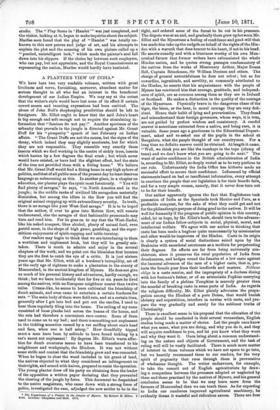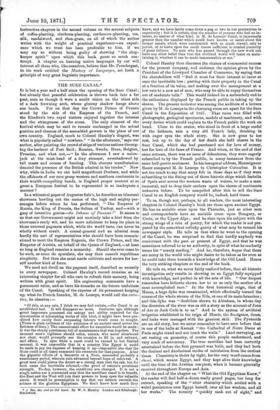A PLANTER'S VIEW OF INDIA.* WE have here two very
readable volumes, written with great liveliness and verve, furnishing, moreover, abundant matter for serious thought to all who feel an interest in the beneficent development of our Indian Empire. We may say at the outset that the writer's style would have lost none of its effect if certain covert sneers and taunting expressions had been omitted. The abuse of John Bull's shopkeeping proclivities should be left to foreigners. Mr. Elliot ought to know that the said John's heart is big enough and soft enough not to require the stimulating in- formation that "famines do not pay !" Another specimen of the urbanity that prevails in the jungle is directed against Mr. Grant Duff for his " prosperity " speech of last February on Indian affairs. "The Grant Duffs are not the causes, but the signs of the decay, which indeed they may slightly accelerate, but for which they are not responsible. They resemble very exactly those insects which we find working in the centre of sickly trees, insects which hasten by a few degrees the final crash ; but which never would have existed, or have had the slightest effect, had the state of the tree not provided them with a fitting home." We believe that Mr. Grant Duff would find a fitting home in any high sphere of politics, and that of all public men of the present day he least deserves language so unbecoming as this. In another place, in a chapter on education, our planter plays the cynic most ferociously. "You will find plenty of savages," he says, "in North America and in the jungle ; in the middle ranks of civilized life savagedom materially diminishes, but among the idlers in the Row you will find the original animal cropping up with extraordinary severity. In truth, there is no savage like your West-End savage." It is to be hoped that the author, if ever he goes into Rotten Row, will remain undiscovered, else the savages of that fashionable promenade may turn and rend him. For he goes on to say that the West-Ender, like his naked compeer, likes alcohol, plenty of animal food, even putrid meat, in the shape of high game, gambling, and the super- stitious enjoyments of spirit-rapping and table-turning.
Our readers may begin to think that we are introducing to them a worthless and unpleasant book, but they will be greatly mis- taken. There is much to admire and enjoy in the several chapters of the work, and we point out the blemishes first because they are the first to catch the eye of a critic. It is just sixteen years ago that Mr. Elliot, with all a borderer's intrepidity, set off at the early age of eighteen to make a plantation in the county of Munzerabad, in the ancient kingdom of Mysore. He does not give us much of his personal history and adventures, hardly enough, we think ; but we learn incidentally that for fire or six years he lived among the natives, with no European neighbour nearer than twelve miles. Crusoe-like, he seems to have cultivated the friendship of dumb animals, and even came to entertain a certain fondness for rats. "The main body of them were field rats, and at a certain time, generally after I got into bed and put out the candles, I used to bear them regularly filing into the house. The ceiling of my room consisted of loose planks laid across the beams of the house, and the rats had therefore a convenient race-course. Some of them used to come on to my bed ; and there is something not unpleasant in the tickling sensation caused by a rat sniffing about one's head and face, when one is half asleep." How dreadfully hipped must a man have been by solitude to have found tickling by a rat's snout not unpleasant ! By degrees Mr. Elliot's warm affec- tion for dumb creatures seems to have been transferred to his neighbours and workpeople, the Hindoos. It was not without some strife and contest that the friendship grew and was cemented. When he began to clear the wood included in his grant of land, the natives objected to what they considered an infringement on tbeirrights, and armed with knives, prepared to resist the operation. The young planter drew off his party on obtaining from the leader of the opposition a written paper declaring that they prevented the clearing of the jungle by force. This document he despatched to the native magistrate, who came down with a strong force of police, investigated the case, adjudged the new settler to be in the
• The Experiences of a Planter in the Jungles of Mysore. By Robert H. Elliot. 2 fee& London: Chapman and Hall. 157L
right, and ordered some of the forest to be cut in his presence. The dispute was at an end, and gradually there grew up between Mr. Elliot and the Mysoreans a feeling of confidence and good-will that has made him take up the cudgels on behalf of the rights of the Hin- doo with a warmth that does honour to his heart, if not to his head. He asserts roundly and with a bluntness worthy of his own Mun- zerabad farmer that former writers have calumniated the whole Hindoo nation, and he quotes strong passages condemnatory of the natives from the works of Missionary Arthur, Major Evans Bell, Captain Brinekman, Sir William Denison and others. The charge of general untruthfulness he does not rebut ; but as for cowardice, ingratitude, and servility, so commonly attributed to the Hindoo, he asserts that his acquaintance with the people of Mysore has convinced him that courage, gratitude, and independ- ence of spirit, are as common among them as they are in Ireland or Scotland. He makes a distinction in the quality of the courage of the Mysoreans. Physically brave in the dangerous chase of the tiger, the bison, or the bear, in moral courage they are very defi- cient. Hence their habit of lying and prevarication. They dread and misunderstand their foreign governors, whose ways, it is true, are not guided by perfect wisdom and consistency. A candid answer is sometimes extracted from a native, and being rare, it is valuable. Some years ago a gentleman in the Educational Depart- ment, asked and re-asked one of the pupils in the school at Bangalore, what the people thought of our countrymen. For a long time no definite answer could be obtained. At length it came. "Well, we think you are like the monkeys in the tope (clump of trees) and we don't know what you are going to do next." The want of native confidence in the British administration of India is, according to Mr. Elliot, so deeply rooted as to be very perilous to our rule. Unfortunately the India Office has hitherto made no successful effort to secure their confidence. Influenced by official statements based on bad or insufficient information, every attempt to convince the people that our legislation is for their benefit fails, and for a very simple reason, namely, that it never does turn out to be for their benefit.
Our author apparently ignores the fact that Englishmen took possession of India as the Spaniards took Mexico and Peru, as a profitable conquest, for the sake of what they could get and not for the philanthropic purpose of doing good to the natives. It will be well for humanity if the progress of public opinion in this country, aided, let us hope, by Mr. Elliot's book, should turn to the advance- ment of our Indian fellow-subjects in social, physical, moral, and intellectual welfare. We agree with our author in thinking that caste has been made a bugbear quite unnecessarily by missionaries and other would-be improvers of the Hindoo. Caste in its origin is clearly a system of social distinctions seized upon by the Brahmins with sacerdotal astuteness as a medium for perpetuating their dogmas. Its effects are far from being universally mis- chievous, since it preserves the rural population of India from drunkenness, and hedges round the females of a low caste against the immoral advances of the men of a higher caste, that is, pro- tects the female poor from their landlords and masters. Noblesse oblige is a caste maxim, and the impropriety of a duchess dining with her footman's father, or of an aristociatic Popkins marrying into the family of a plebian Tompkins is scarcely greater than the scandal of breaking caste in some parts of India. As regards the religious difficulty, Mr. Elliot plainly advocates the propa- gation among the Hindoos of a pure Deism, that would banish idolatry and superstition, interfere in nowise with caste, and pre- pare the way gradually and surely for the sublimer truths of Christianity.
There is excellent sense in his proposal that the education of the people should be conducted in their several vernaculars, English studies being made a matter of choice. Let the people once know what you mean, what you are doing, and why you do it, and they will acquire confidence in you, and let you know what they want and why they want it. Once bring about a common understand- ing on the nature and objects of Government, and the task of ruling well will be vastly facilitated. There is much more matter of interest in these volumes which we have not space to go into, but we heartily recommend them to our readers, for the very spirit of pugnacity that runs through them is provocative of wholesome thought. The writer endeavours, for example, to take the conceit out of English agriculturists by draw- ing a comparison between the processes adopted or neglected by them and those practised by the natives of Mysore, and his general conclusion seems to be that we may learn more from the farmers of Munzerabad than we can teach them. As for exporting to India our cumbrous improved agricultural machinery, he evidently deems it wasteful and ridiculous excess. There are four
instructive chapters in the second volume on the several subjects of coffee-planting, cinchona-planting, cardamom-planting, tea, silk, sandalwood, and rhea-grass, on all of which the author writes with the weight of practical experience—an experi- ence which we trust has been profitable to him, if we may say so without being guilty of showing "the shop- keeper spirit" upon which this book pours so much con- tempt. A chapter on learning native languages by ear will interest all those who, like ourselves, believe that Mr. Prendergast, in his work entitled the Mastery of Languages, set forth a principle of very great linguistic importance.



































 Previous page
Previous page